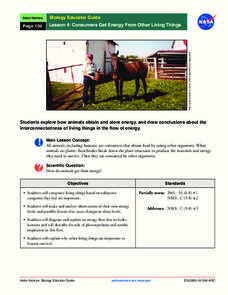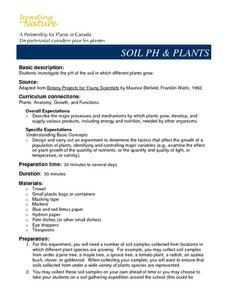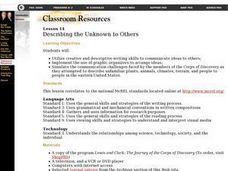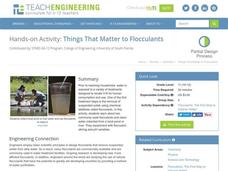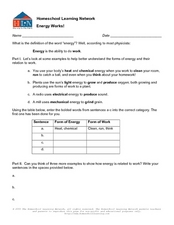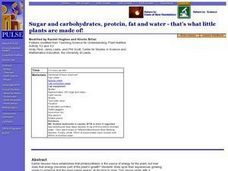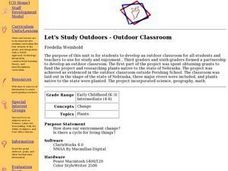NASA
The Case of the Wacky Water Cycle
Join the tree house detectives in learning about the processes of the water cycle, water conservation, water treatment, and water as a limited resource.
Rochester Institue of Technology
Household Container Recycling
Don't throw out this resource ... recycle it! Learners investigate recycling of containers using single stream processes, and then the class discusses the advantages and disadvantages of recycling.
NASA
Consumers Get Energy From Other Living Things
How do plants and animals get their food? Learn about where energy comes from, how animals store energy, and aerobic respiration, in a lesson that allows scholars to diagram energy flows.
Curated OER
Does Dye Die? Foreign Chemicals in Our Environment
Students conduct an experiment to observe photolysis in the lab. In this chemistry lesson, students explain the mechanism behind photolysis. They test the impact of a non-toxic marker to plant metabolism.
Curated OER
Plants In Space
In this biology instructional activity, students grow corn plants in growth pouches as the control group in an experiment on plant growth in microgravity. Then they analyze any differences that occur between Earth-grown and space-grown...
Curated OER
Wiggley Worms
Students investigate how worms affect plant growth. In this biology lesson, students construct a worm ecosystem in a plastic 2 liter bottle and plant a seed in the soil. They later compare the ecosystems with worms to ones without...
Curated OER
Soil pH & Plants
Students investigate the pH of the soil in which different plants grow. They design and carry out an experiment to determine the factors that affect the growth of a population of plants, identifying and controlling major variables...
Curated OER
Breaking It Down
Seventh graders explain the mechanism of digestion. In this biology lesson, 7th graders perform an iodine test to check for the presence of starch. They discuss how energy travels through the food chain.
Curated OER
What is a Seed?
First graders identify the parts of a seed. In this plant biology lesson, 1st graders are given a seed and identify each part of the seed by using a hand lens. Students plant a seed and graph the growth.
Curated OER
Invent an Invertebrate
Design a new organism with recyclable art materials! After learning about the coastal biome, learners brainstorm challenges that a plant or animal may face. They use their ideas to create a creature, complete with environmental...
Curated OER
Chloroplasts and Mitochondria
For this biology worksheet, students read about the mechanism of photosynthesis to answer 43 short answer questions. They explain the role of chloroplasts in the process.
Curated OER
Describing the Unknown to Others
Students examine the challenges faced by the Corps of Discovery on the Lewis and Clark expedition. They listen to online journal entries written by members of the Corps, complete an activity sheet, watch a video segment, and write a...
Curated OER
Plants
Really only five slides of information, this resource is an outline on planting field crops. From it, aspiring agriculturists are exposed to different seeding methods: drilling, row crop planting, broadcast seeding, and air seeding. This...
Curated OER
Flutter Farm
Sixth graders complete activities to examine butterflies and their habitats. For this butterfly habitat lesson, 6th graders research butterflies and their habitats to help them investigate how to make a butterfly garden. Students...
Teach Engineering
Things That Matter to Flocculants
How does the dirt get out of your drinking water? A hands-on activity introduces the use of flocculants to help clear solid particles out of water. The plan walks learners through the process of setting up an experiment that controls the...
Baylor College
Need or Want?
Even as adults it can be hard to distinguish needs from wants. Using pictures of common, everyday items, children make a pocket chart separating the objects they need from those that they want. Discuss their choices, explaining that...
American Museum of Natural History
What's This? Staying Safe
Amaze the class with the creative adaptations species employ to trick predators. An online interactive lesson introduces learners to six different species with unique adaptations. Each species highlights a different adaptation and its...
Curated OER
Couch Potato or Inertia Victim?
Sixth graders how primary research is carried out. They design a simple survey questionnaire to interview people about their week average television watching time. They analyze the results and write a report based on the information.
Curated OER
Energy Works!
For this energy worksheet, students review the different types of energy and determine what form of work that energy provides. Then students give examples of how energy is related to work. This worksheet has 1 graphic organizer and 3...
Curated OER
Sugar and carbohydrates, protein, fat and water - that's what little plants are made of!
Students identify photosynthesis as the mechanism by which plants convert sunlight energy into a usable energy source for plant processes. They identify photosynthesis as the mechanism by which plants create a molecule that can be used...
Curated OER
Let it Grow!
Pupils explain the relationship of plants and animals in the environment. They name the basic requirements for plant growth and define the terms photosynthesis, stomata, chlorophyll and xylem.
Curated OER
Great Gravity, Batman!
Eleventh graders are introduced to the effect of gravity on plant growth. They describe the major processes and mechanisms by which plants grow, develop, and supply various products, including energy and nutrition, needed by other...
Curated OER
PROTOPLAST PRODUCTION
High schoolers are allowed to strip away the cell walls of plants cells (using enzymes) and then observe the resulting spherical protoplasts (plant cells minus the cell wall). They see that plants cells indeed have a plasma membrane in...
Curated OER
Let's Study Outdoors - Outdoor Classroom
Students research native plants. They identify the plant by scientific name, size, amount of water needed and color. Pupils measure and plot an area of school property. Students create an outdoor classroom. Additional cross curriculum...




